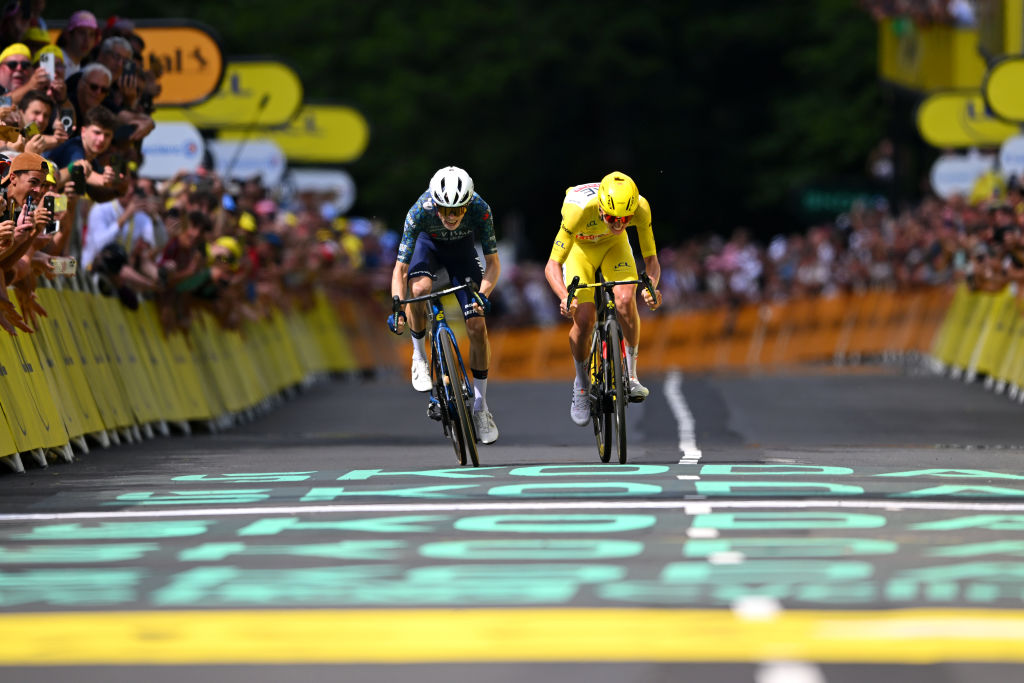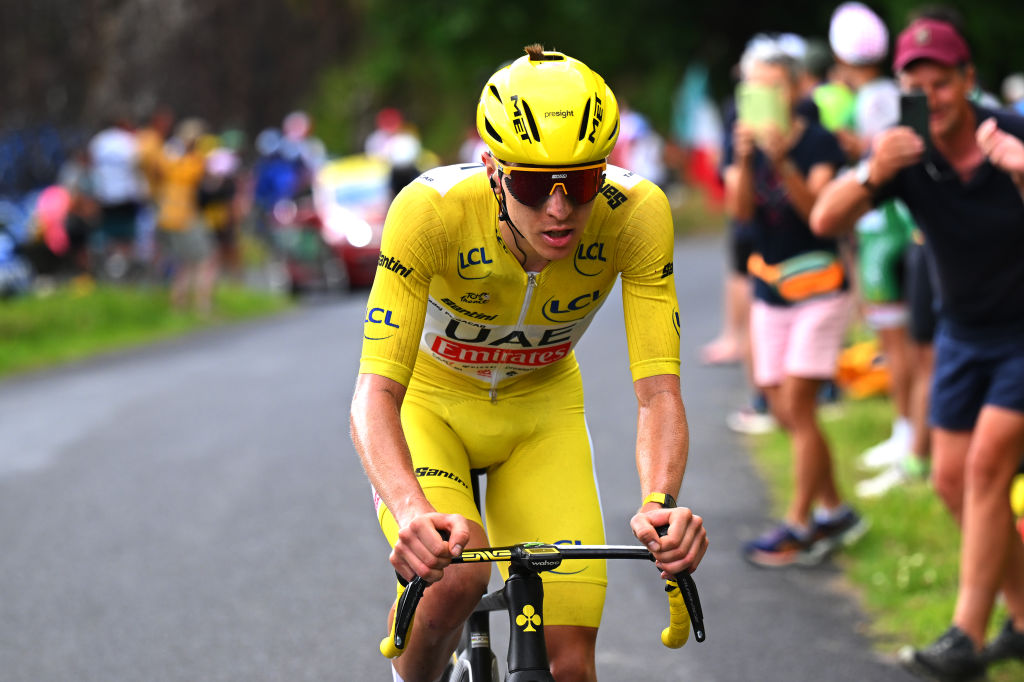Tour de France momentum with Jonas Vingegaard as he gives Tadej Pogačar reason to doubt - Analysis
Dane gained a second at Le Lioran and much more in psychological battle

After the podium ceremony at Le Lioran, Tadej Pogačar made the maillot jaune’s sponsor-mandated appearance on France TV’s Vélo Club show, where French national coach Thomas Voeckler, moonlighting as a pundit in July, greeted him with his usual bonhomie.
Stage 11 of the Tour de France had been high on drama and Voeckler, in keeping with the enthusiastic tone of a programme where the most stringent criticism in recent years has been reserved for environmental protesters, was on hand to hype up the day’s action a little further.
“Tadej, you won the Giro d’Italia really easily but here on the Tour, you’re in a tight race with Jonas Vingegaard, Remco Evenepoel and Primož Roglič – does the competitor in you prefer being in this kind of tough contest?” Voeckler asked.
Pogačar’s tired eyes told Voeckler and the rest of us all we really needed to know about what kind of contest he preferred, but the Slovenian understood the drill. Here, the default setting is ‘Vive le Tour,’ come what may.
"Yeah, it’s beautiful to see,” Pogačar said, doubtless silently wishing he had spent the afternoon on an Italian mountain pass with only overly eager tifosi for company, as he had done in May. Instead, his brief spell of solitude in the Massif Central was interrupted by the most unwelcome companionship of all – Jonas Vingegaard’s.
This Tour is not going to be a procession like May’s Giro d’Italia. If Pogačar didn’t know it already, he certainly does now, after a stage where he delivered an apparent knock-out blow only for his rival to bounce back off the canvas immediately and then claim the round for himself on points. Pogačar-Vingegaard Part IV, like the last two instalments of the duel, looks set to endure into the third week.
On the eve of the stage, UAE Team Emirates sports manager Matxin Joxean Fernandez had suggested this would be a day where his team would ride defensively, but it’s doubtful anybody bought the ruse. In any case, UAE’s strategy was already clear by the time the race hit the arduous final 50km, when they began dialling the pace up to unbearable levels of intensity on the Col de Néronne.
Get The Leadout Newsletter
The latest race content, interviews, features, reviews and expert buying guides, direct to your inbox!
The steady torture amped up still further on the Puy Mary, where Adam Yates’ supersonic turn stripped Vingegaard, Remco Evenepoel and Primoz Roglič of their remaining teammates. Men like Matteo Jorgenson, Mikel Landa and Jai Hindley were emphatically distanced. Such sequences have become almost routine in the era of the so-called ‘new cycling,’ but damage like this – on a medium mountain stage – was still utterly startling.
Attack

Like on the Galibier last week, Pogačar’s inevitable attack came near the top of the climb, with a shade over 30km to race. Like on the Galibier, the Slovenian’s initial acceleration took him clear of Vingegaard et al, and his power saw him extend the advantage beyond half a minute on the descent that followed. For a few kilometres, it looked as though he was in the process of winning the Tour there and then.
“I just wanted to make a gap on Puy Mary, I know this climb really well and the downhill was a lot for pedalling,” Pogačar said. “I was thinking I could go from there to the finish, like on the Galibier.”
Instead of offering a repeat of the Galibier, this stage carried faint echoes of more distant Tour moments. When Vingegaard caught Pogačar on the following Col de Pertus, it was hard not to think of Eddy Merckx attacking in yellow on the Col d’Allos in 1975 only to be passed by Bernard Thevenet at Pra Loup, or of Laurent Fignon overtaking Bernard Hinault on the road to l’Alpe d’Huez nine years later.
Unlike Merckx and Hinault, of course, Pogačar avoided the indignity of being dropped by Vingegaard, who acknowledged that he, too, was suffering on the final climb of the Col de Font de Cère. That was indicated by the impressive display of Remco Evenepoel, who limited the damage to 25 seconds by day’s end to remain second overall, 1:08 off Pogačar.
Despite his apparent fatigue, however, Vingegaard looked the more comfortable of the two leaders in the final 15km, and that impression was borne out when he upset his rival in the two-up sprint to claim stage honours.
The results sheet is often an unreliable narrator of a bike race, and certainly at this early juncture in a Grand Tour. Although Vingegaard only clawed back a second on Pogačar – he remains third overall, now 1:14 off the yellow jersey – the psychological blow struck here cannot be overestimated. The momentum of this race was all with Pogačar in week one, but it has tilted back towards Vingegaard since Sunday’s trek across the gravel at Troyes.
It would have been one thing had Pogačar attacked and failed to shake off Vingegaard here; he might have convinced himself afterwards that he was at least in the process of breaking his foe’s resistance. After losing a 35-second lead to Vingegaard on terrain like this, Pogačar will instead be questioning himself.
Technically, Pogačar lost the stage by mere centimetres, but the true scale of the defeat was rather bigger, not least because of the confidence Vingegaard will have drawn from his successful solo pursuit. Any concerns Vingegaard had about his recovery from his Itzulia Basque Country crash will surely have dissipated once he caught sight of Pogačar’s rear wheel on the Pertus.
In his post-stage press conference, Pogačar attempted to couch his day as a draw. By his telling, he had scored early with his rasping attack over the Puy Mary, only for Vingegaard to equalise in the finale. The time gap remains more or less what it was before, and now they’ll do it all over again in the Pyrenees at the weekend.
“I don’t see it’s a slight advantage to Jonas: at one point it was one guy better, then another,” Pogačar said. “We were pretty equal but at different times of the stage. Today was different racing to what we will have in the next days. We will see in the big mountains how it will go.”
True, but Vingegaard will now be much surer of himself on the road to Pla d’Adet on Saturday, while Pogačar, for the first time in his astonishing 2024 season, must reckon with an unfamiliar feeling: doubt.
Get unlimited access to all of our coverage of the Tour de France - including breaking news and analysis reported by our journalists on the ground from every stage of the race as it happens and more. Find out more

Barry Ryan was Head of Features at Cyclingnews. He has covered professional cycling since 2010, reporting from the Tour de France, Giro d’Italia and events from Argentina to Japan. His writing has appeared in The Independent, Procycling and Cycling Plus. He is the author of The Ascent: Sean Kelly, Stephen Roche and the Rise of Irish Cycling’s Golden Generation, published by Gill Books.